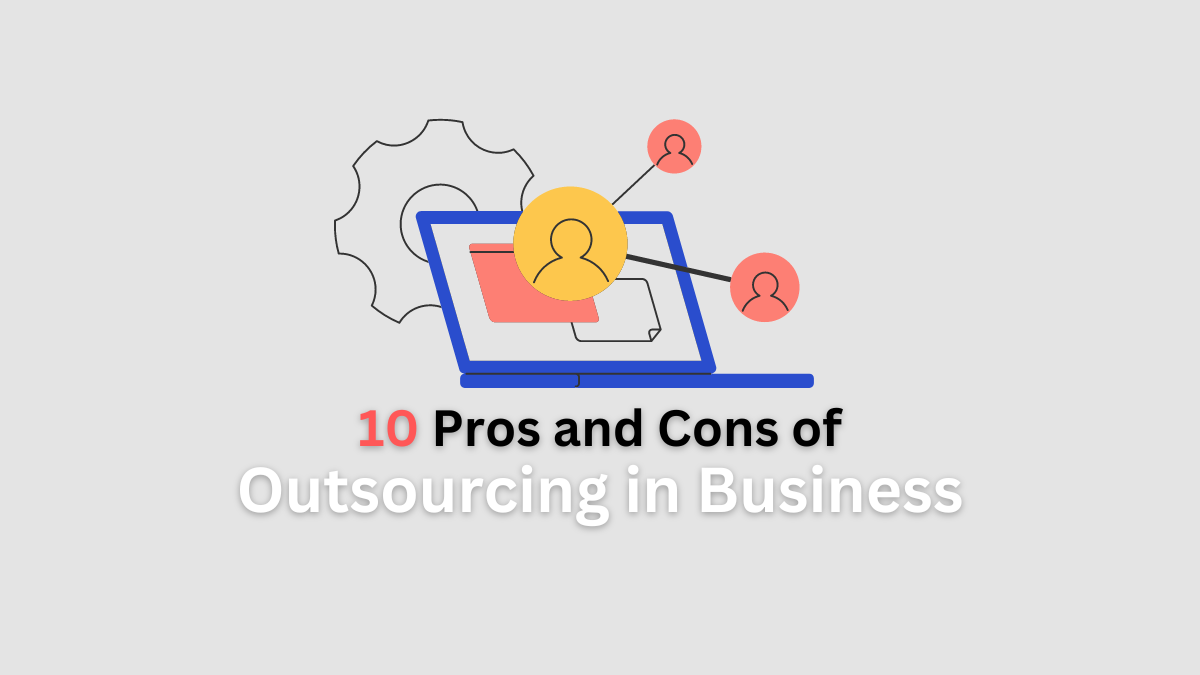Pros and Cons of Outsourcing
Outsourcing is the practice of hiring external individuals or companies to perform tasks or services that are typically handled internally. This can range from hiring freelancers to engaging specialized firms, often to reduce costs, improve efficiency, and access expertise not available in-house.
Here we will discuss the 10 major pros and cons of outsourcing in business, so let’s get started:
Pros of Outsourcing
Outsourcing can bring various benefits to business, here are five to mention:
Cost Savings
Outsourcing often leads to significant cost savings. Hiring external talent can be cheaper than employing full-time staff, especially when outsourcing to countries with lower labor costs.
This not only reduces direct labor expenses but also saves on ancillary costs such as employee benefits, training, and infrastructure. These savings can be redirected to other areas of the business, potentially increasing overall profitability.
Access to Expertise
Outsourcing allows businesses to tap into a global pool of experts. Companies can engage professionals who specialize in specific tasks, ensuring high-quality work that may not be possible with in-house teams.
For instance, outsourcing marketing tasks to a specialized agency can provide access to top-tier talent and innovative strategies, which might be beyond the reach of a small business’s budget if hired internally.
Enhanced Focus on Core Activities
By outsourcing non-core functions, businesses can concentrate their resources and efforts on core activities that directly contribute to their competitive advantage and growth.
This allows the leadership and in-house teams to focus on strategic initiatives, product development, and customer service, thereby enhancing overall business performance.
Increased Efficiency and Productivity
Outsourcing can streamline operations and boost efficiency. External providers often have the expertise, technology, and processes in place to complete tasks more quickly and effectively than an in-house team. This increased efficiency can lead to faster project completion, allowing businesses to meet deadlines and customer expectations more consistently.
Read More: 10 Major Pros and Cons of Globalization
Scalability and Flexibility
Outsourcing provides businesses with the flexibility to scale operations up or down as needed. During peak periods, companies can quickly add resources without the long-term commitment of hiring full-time employees.
Conversely, during slow periods, they can reduce outsourcing without the complications associated with layoffs or reduced staff hours. This scalability helps businesses adapt to market demands and economic fluctuations more smoothly.
Cons of Outsourcing
Now, let’s explore the five main disadvantages of outsourcing in business:
Loss of Control
Outsourcing means losing some degree of control over how tasks are performed. When tasks are handed over to third parties, businesses may find it challenging to monitor and ensure that work is completed to their standards and specifications. This can lead to inconsistencies in quality and alignment with the company’s vision and goals.
Read More: 10 Major Pros and Cons of Job Specialization
Security and Privacy Risks
Sharing sensitive information with external parties can expose businesses to security breaches and data privacy issues.
If the outsourcing partner lacks robust security measures, confidential business and client information could be at risk. This can lead to legal complications, financial losses, and damage to the company’s reputation.
Quality Concerns
While outsourcing can provide access to expertise, it can also lead to quality issues if not managed carefully. The focus of some outsourcing partners might be on maximizing profit rather than maintaining high standards.
This could result in subpar work, missed deadlines, and ultimately, dissatisfied customers. Ensuring quality requires diligent oversight and clear communication of expectations.
Read More: 10 Major Pros and Cons of Diversity
Hidden Costs
Despite the potential for cost savings, outsourcing can incur hidden costs that were not initially apparent.
These can include the costs associated with managing the outsourcing relationship, addressing misunderstandings, handling delays, and integrating outsourced work with in-house processes. Over time, these hidden costs can erode the financial benefits of outsourcing.
Cultural and Communication Barriers
Working with external partners, especially those in different geographical locations, can introduce cultural and communication challenges.
Differences in time zones, languages, and business practices can lead to misunderstandings and misalignments. Effective communication is crucial to ensure that both parties are on the same page, which can sometimes be difficult to achieve.
Hence, these are the 10 major pros and cons of outsourcing in business.
Read Next: 10 Major Pros and Cons of Business Ethics in Business
